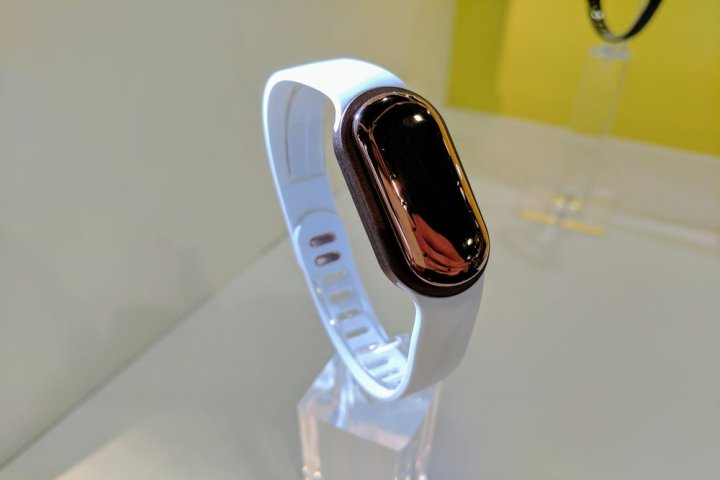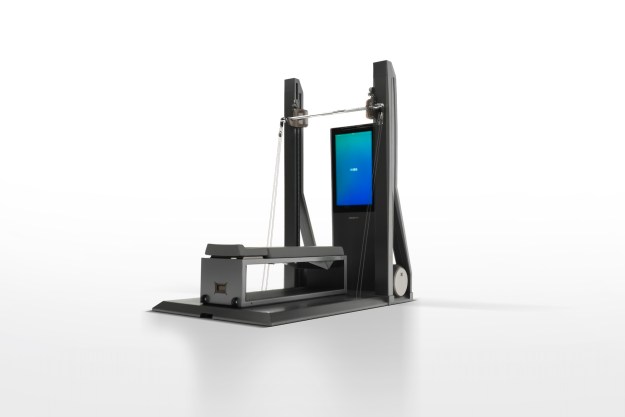
The Onitor, a oblong, LED-illuminated smartwatch constructed of water-resistant metalized ceramic and stainless steel, fits around a wearers’ wrist like an off-the-shelf fitness band. But unlike most, it’s removable: The Onitor’s bullet-shaped exterior slots into a ceramic clip that tracks real-time heart rate with an ECG sensor. Over time, an algorithm helps find the cardiac activity zone where fat is burned. And as an added benefit, a built-in battery recharges the fitness band as it’s being used.
When the Onitor isn’t tracking heart rate, it’s reminding the wearer of fitness commitments. The experience begins with Onitor’s companion smartphone app, which requests basic physiological characteristics like height, weight, date of birth, and gender. Then, it prompts the wearer to select a weight-loss goal within an established time frame. And finally, it generates a long-term fitness plan tailored to the data provided.
Over the course of weeks, the Onitor app regularly reminds the wearer to perform fitness routines pulled from the app’s paid subscription catalog. And depending on his or her weight loss progress (or lack of), it scales up or ramps down the workouts accordingly. It might suggest a less intensive routine, for example, or spread out the number of workout days.
Otherwise, the Onitor performs the functions of a standard fitness tracker. A built-in 3-axis accelerometer and pedometer counts steps, and the app shows the number of calories burned, hours slept, and hours active, along with an, supplementary nutritional and dietary guide.
“We deliver targeted solutions for real people’s needs. We live in a data-driven, digital age. But when you look at the way that people are encouraged to lose weight, they are still by and large using old-fashioned methods with very limited use of data to help them,” Amit Ben-Haim, CEO of Cloudtag and creator of the Onitor brand, said in a press release. “That’s where we think the Onitor Track can help. The Onitor Track succeeds by combining accurate data capture, which helps it build an excellent picture of each user, and smart manipulation of that data to make a fitness and nutrition program that is constantly refined to gain excellent results. Together, these two things show off two great strengths of our business: the hardware and the software, brought together with a highly targeted purpose.”
The Onitor Track debuts at a time when two thirds of adults are overweight or obese, according to the World Health Organization, and when more people die from cardiovascular disease than from any other cause.
But it also follows on the heels of a class-action lawsuit filed by purchasers of Jawbone Up, Fitbit, and Nike Fuelband owners alleging that those fitness trackers encouraged them to gain weight rather than lose it. The plaintiffs in those actions contend that the wearables’ metabolic recommendations consistently overestimated the amount of calories they could consume, and that they didn’t take into account fitness factors like time of day, activity averages, stress levels, and others.
It remains to be seen if the Onitor Track can motivate weight loss any more effectively than the competition. But a personalized approach to fitness is, at the very least, the seed of a good idea.
The Onitor Track is available in three color configurations — black, gold, and white — and ships later this year.
Editors' Recommendations
- I wore the Whoop 4.0 fitness tracker for a month. Here’s why I’m getting rid of it
- The app for your Garmin wearable is getting a huge overhaul
- Oura Ring gets serious about fitness, now syncs with Strava
- Garmin’s $150 Vivosmart 5 fitness band has some stiff competition
- NordicTrack iSelect dumbbells let you customize your workout with Alexa


